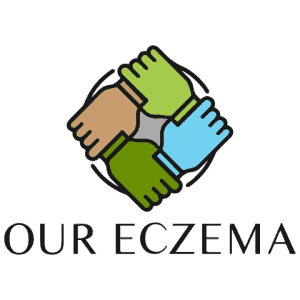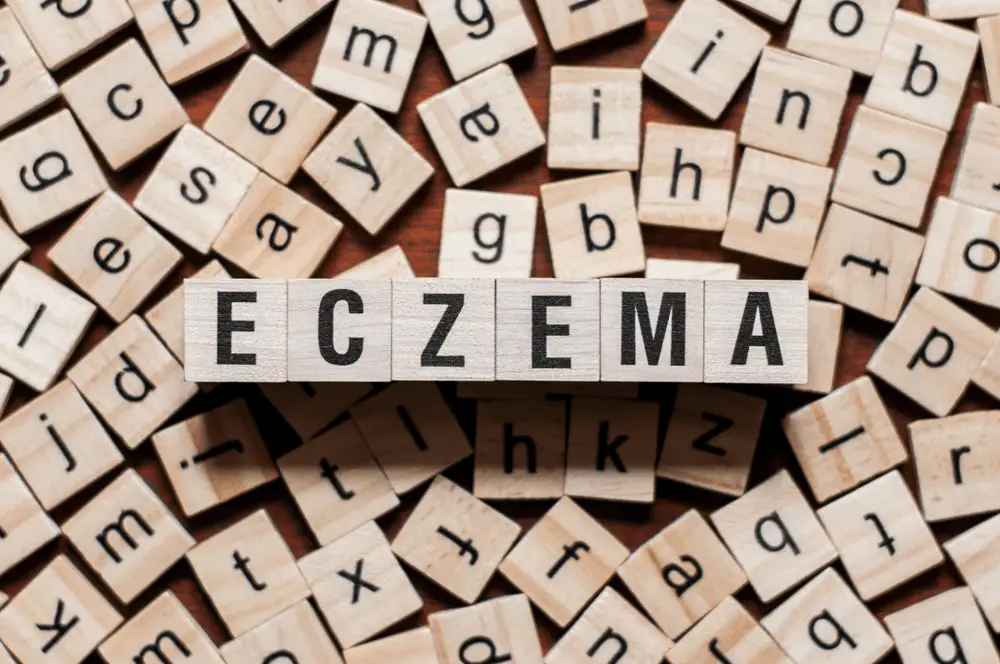The signs of baby eczema are not so obvious. While anyone can be impacted by eczema, the problem tends to surface when one is very young. In fact, impacted babies will begin showing the signs of eczema at a very early age. As a parent, it is pertinent to learn about these signs so you will be able to diagnose the problem and get your child help much quicker.
So, what are the most common signs of eczema in babies? The most common signs include redness and scaling of the skin. You may also notice that your baby will begin scratching their skin or trying to. Again, your child will be unable to talk to you at this age. Therefore, you have to identify the problem by looking for the signs.
If you’re able to do that, you’ll be able to get your child treatment much sooner. In return, the problem can be dealt with right away and that may help keep the symptoms at bay for many years to come. Within this article, you will learn more about the signs that your baby may have eczema.
#1 Patches Of Red Skin
The first thing you should do is look at your child’s skin. This is one of the best ways to determine whether your child is suffering from a skin condition such as eczema. Check the baby’s skin carefully for red patches. With eczema, the child is going to develop inflammation on the skin. This means that their skin will swell to some degree. You should know that there are multiple conditions that can result in red, inflamed skin.
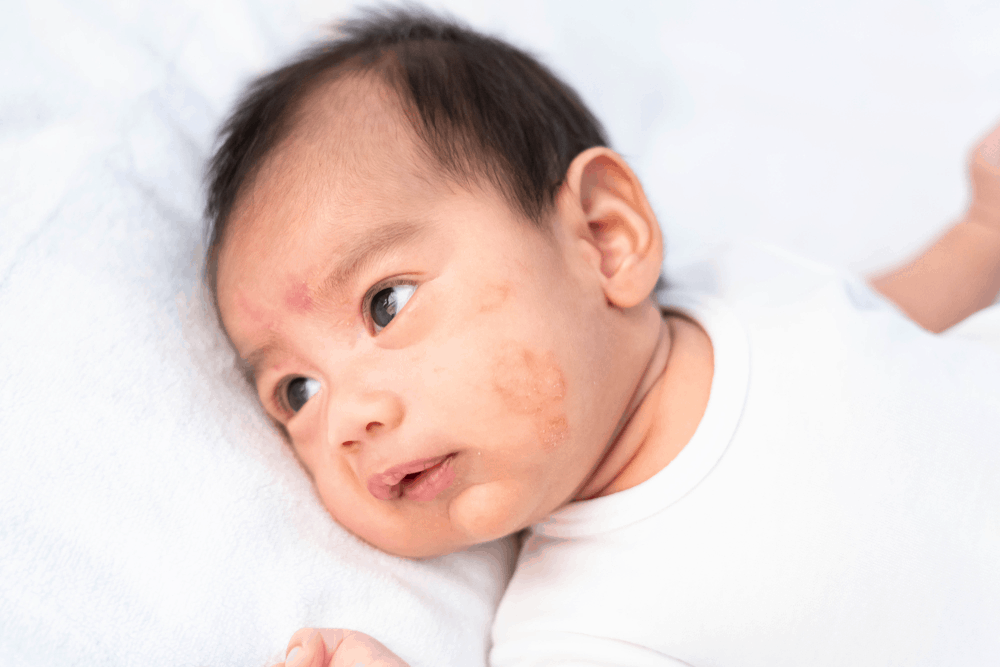
Therefore, you’ll need to be able to tell the difference between them. If it is eczema, the skin will be red and the rashes will be oval in shape. It can be difficult to diagnose the problem on your own. Therefore, you should take your child to the doctor once you’ve noticed something out of the ordinary.
#2 Dry, Itchy Skin
Another thing to look for is dry, itchy skin. Will your child scratch? It depends on their age at the current time. Even a baby can make an attempt to scratch when they’re feeling itchy. Either way, you should be able to spot the difference by looking at the child’s skin. Someone with eczema is going to develop dry patches of skin. The skin will become dry to the point where it is scaly or flaky.
Again, your child may attempt to scratch the spot in question. If they do, you can guarantee that you’ve got a problem. It is best to speak with a medical professional. However, you should try adding moisturizer to the impacted area. This will clear up the dry skin to some degree. You’ll also need to take steps to prevent your child from scratching since this will only make matters worse.
#3 Babies Scratching
When it comes down to it, you should take the time to analyze your child’s behavior. Many parents do not realize it but babies will scratch their skin. This is something you can look for when you’re trying to diagnose eczema or another skin condition. You need to pay attention to your child’s hands. Do they appear to be matching a scratching motion near the inflamed area? If so, there is a good chance that you’re dealing with eczema.
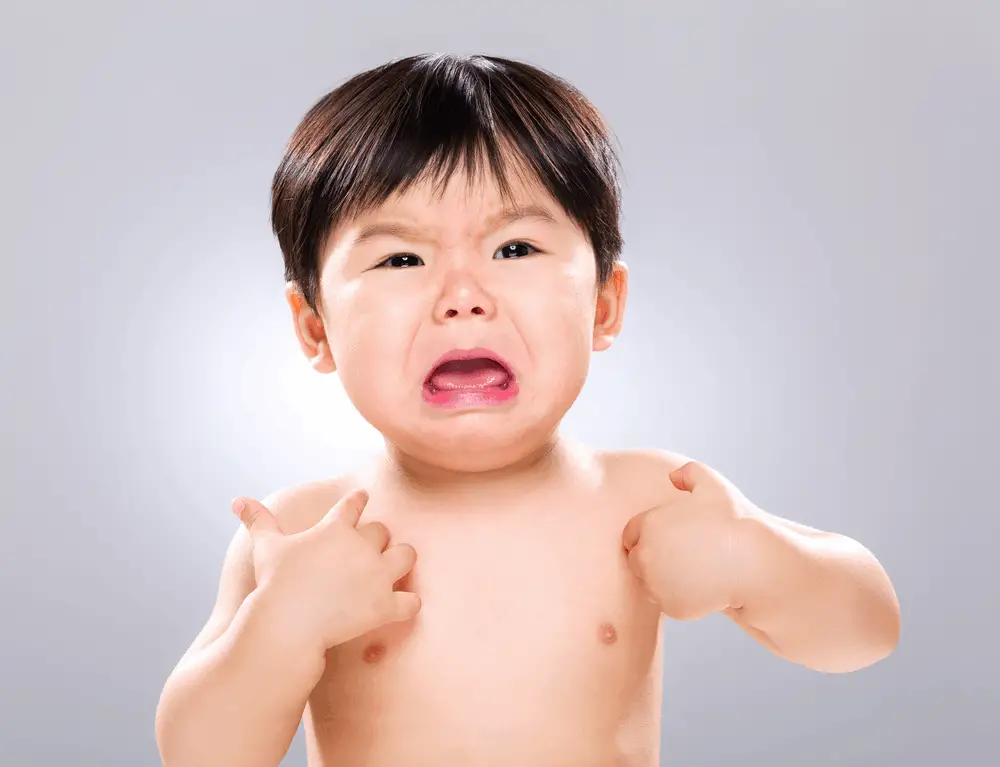
However, it can be tough to know for certain. Therefore, it is best to get your baby checked out by a medical professional. Simultaneously, you need to find a way to stop the child from scratching. The best way to do that is by purchasing baby gloves. These gloves will cover the child’s fingertips and prevent them from digging into their flesh.
In return, this will stop the condition from worsening.
#4 Pay Attention To Triggers
It should be noted that some environmental factors can cause eczema to flare-up. This means that they cause the condition to worsen and that is something you have to be very cautious about. Sometimes, your baby may not show any symptoms at all. Then, the symptoms get worse out of nowhere. There is something out there that is triggering the problem and making it worse. You need to take note. Pay close attention to these triggers as they can confirm that your child is dealing with eczema.
Not all skin problems have triggers, but eczema does. On top of that, you’ll need to identify these triggers so you can avoid them. Otherwise, your child’s problem is going to spiral out of control and you won’t be able to do anything about it. Therefore, not only do you need to identify your child’s triggers, but you need to identify them early on, so you can help him or her to avoid them before they can even start. This is the best way to prevent the problem from getting worse in the future.
Some of the most common triggers associated with eczema include soaps, skincare products, certain foods, the environment, and synthetic fabrics. Be cautious and make sure your child avoids anything that could result in the problem getting worse.
#5 Look For Asthma And Hayfever
It should be noted that eczema can be associated with other health conditions. If your child has eczema, there is a good chance that they’re going to have asthma or hayfever too. This isn’t definite but it is something you should look for. You shouldn’t worry about it too much though. A baby with eczema may or may not develop asthma. You shouldn’t freak out about it yet. Still, this is something to consider when attempting to diagnose the problem.
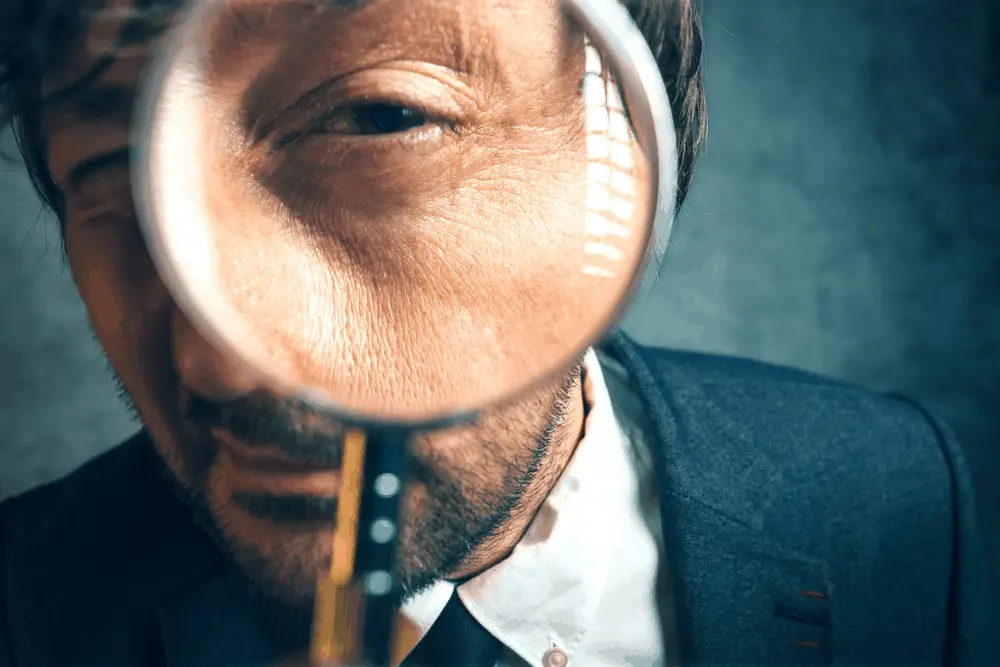
If your child has a skin condition alongside asthma or hayfever, there is a higher possibility that it is eczema. Still, you’ll want to get your baby checked by their pediatrician to be certain. You should cross your fingers as well. After all, many babies could grow out of these problems with patience.
#6 Bleeding Skin
One of the most notable signs of baby eczema is bleeding skin. When you notice that your baby’s skin is bleeding, you absolutely know something is wrong. You cannot wait any longer. You need to act immediately. Once it reaches this point, you know that your child’s condition has become much worse. It needs to be treated by a medical professional. First and foremost, you need to cover the irritated skin. If you do not, your child is going to keep scratching it. This could lead to an infection in the future.
It is a good idea to treat the skin with a cream or ointment. This will spot the bleeding and speed up the recovery process. Again, putting gloves on your child’s hands can prevent them from scratching the wound. You have to be proactive to prevent your child from making the problem much worse.
#7 Look For Rashes
The most obvious sign of eczema is rashes. As mentioned above, this type of skin condition is going to result in red, dry, itchy skin. You need to know where to look. Remember that eczema tends to develop in certain places when your child is very young. When it comes to babies, the rash will generally appear on the child’s scalp or face. You’ll want to look here first. Once your child gets older, the rash will spread to the folds of their knees and elbows. Teens and adults will develop rashes on their feet and hands.
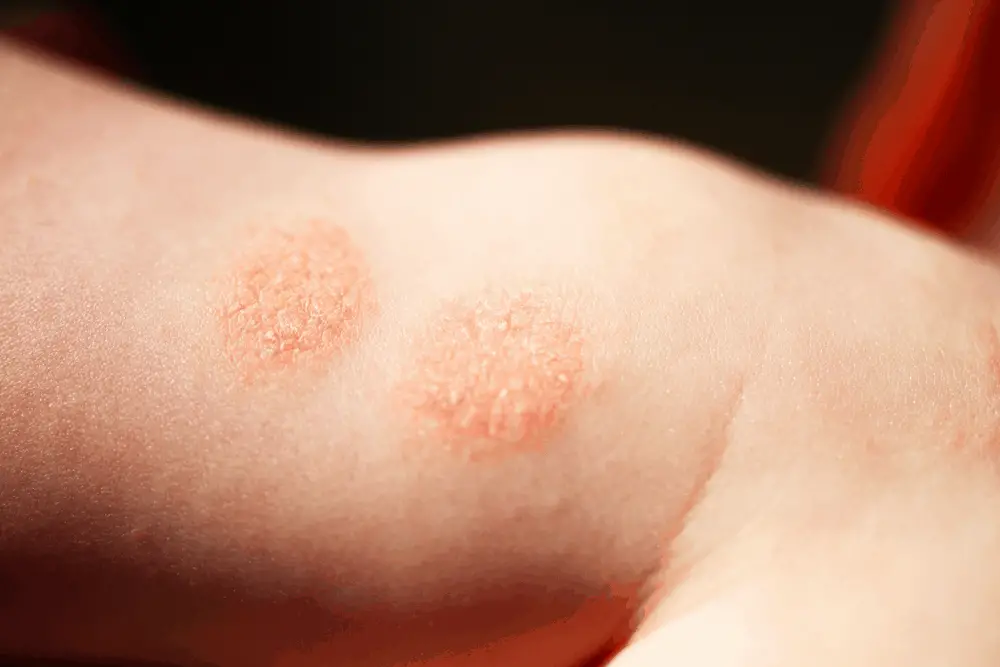
If you have a suspicion that your baby has eczema, you should take a closer look at his or her face and scalp. If they do, you’re going to find rashes on these parts of the body. Once you’ve spotted these signs, you should take your baby to the doctor for a more definite diagnosis. Your doctor will be able to provide you with a treatment plan too. In general, it is best to begin applying non-fragrance moisturizer to the skin immediately.
Pay close attention to the materials your baby encounters. It’s recommended to avoid scratchy materials, such as wool because these can irritate the baby’s sensitive skin.
#8 Irritability
Baby’s express their feelings through behavior. A happy baby is a healthy baby in most cases. A baby suffering from eczema will be irritable. This is the only way your baby has to tell you that he or she is not feeling well. If your baby is crying more than normal, you should immediately look at their skin. If you detect any of the symptoms associated with eczema, you should schedule an appointment with your pediatrician. The quicker you have your baby assessed, the quicker the pediatrician can provide a diagnosis and treatment.
An irritable, crying baby is not always a sign of eczema. However, this behavior is a good sign that something abnormal is going on in your baby’s body. An experienced pediatrician will immediately assess your baby from head to toe, looking for abnormalities. If your baby has eczema, their skin will show the symptoms.
It’s crucial for parents to not feel guilty because their babies have eczema. In most cases, eczema cannot be avoided. This is especially true when the condition is related to allergies because most parents are not going to know in advance what their baby is allergic to. Once you do know your baby’s allergies, you will be able to avoid them altogether.
#9 Oozing Red Bumps
Another sign of baby eczema is oozing red bumps. While this symptom may not appear immediately, its onset is inevitable. This symptom can be very disturbing for parents because it is also associated with other conditions, such as diaper rash. Even though the red bumps associated with diaper rash will be located on the skin underneath the diaper, eczema bumps can also be found in the same area.
You will need to take your baby to a pediatrician to determine their real diagnosis. The right diagnosis is critical in this case because the eczema symptoms can be grueling. And, it’s even worse for babies because they cannot tell their parents they are suffering.
Treating the oozing red bumps associated with eczema will start with good skincare. Bathing with gentle hypoallergenic soaps and frequent moisturizing is the best way to reduce eczema flare-ups. For severe cases, pediatricians will prescribe corticosteroid creams or ointments. These medications are available over the counter but parents should seek the advice of a pediatrician before treating their infant.
If the oozing bumps are located in the baby’s diaper area, you should consider removing the diaper and allowing the skin to air out. This will help dry up the bumps and speed up the healing process.
Summary
Eczema in babies is worse because they cannot tell their parents how they are feeling. Parents should not treat their baby’s eczema with over-the-counter antihistamines or hydrocortisone creams and ointments without consulting a pediatrician. However, you can utilize moisturizers designed for babies to soothe the skin. But, you must be careful about putting the moisturizers on the baby’s hands because the hands always end up in the baby’s mouth. Learn the signs of baby eczema, so you will be prepared in the event your baby develops the condition at some point.
Related Questions
How do I stop my baby from scratching their eczema at night?
There are several ways to prevent your baby from scratching their eczema. The first thing is to apply topical moisturizers right before bedtime. This will help soothe the baby’s skin and reduce the symptoms associated with eczema. Another solution is baby gloves. These tiny mittens will fit over the baby’s hands and prevent them from scratching their skin. Baby mittens are available in various sizes and designs, so you will not face any issues finding a pair of mittens for your child.
Is Vaseline good for baby eczema?
Vaseline is not specifically designed to treat eczema. However, it can be utilized to reduce some of the symptoms associated with the condition. A thin layer of Vaseline will go a long way in decreasing dry, flaky skin, keeping the skin moist, and repairing damaged skin.
Check out this article I wrote on the benefits of vaseline when it comes to eczema.
Recent Posts
Eczema vs Bed Bug Bites: How to Tell the Difference? (W/ Pictures)
Trying to figure out the difference between eczema vs. bed bug bites? If your skin is covered in itchy red welts or splotches, your first thought might be that you are dealing with eczema. It is,...
Best Sunscreen for Babies With Eczema: Top 13 Picks (Updated 2020)
With summer always on the verge, it’s never too early to start looking for the best sunscreen for babies with eczema. Oh yes, even though winter is on the rise at the time of this article...
